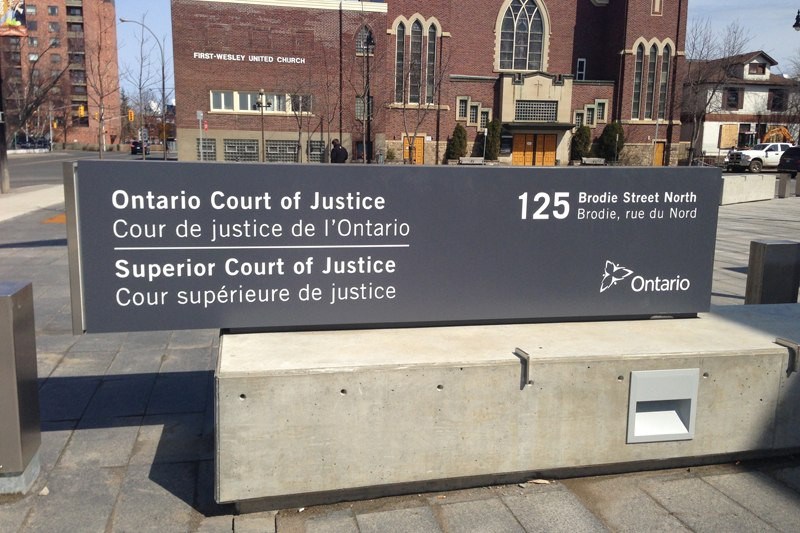THUNDER BAY — A man described as a high-ranking gang member from southern Ontario has been sentenced to 13 years after being found guilty of trafficking fentanyl and cocaine in the city of Thunder Bay.
Vito Bailey-Ricketts, 36, was sentenced by Justice G. Roberts on March 27, 2024, following an eight-week trial where he was found guilty of numerous charges, including trafficking fentanyl and cocaine, possession of fentanyl and cocaine for the purposes of trafficking, conspiracy to traffic in association with a criminal organization, possession of the proceeds of crime, and instructing a person to commit an indictable offence.
The charges date back to spring 2020, during a two-month period when Bailey-Ricketts was selling cocaine and fentanyl in Thunder Bay with the southern Ontario gang, the Eglinton West Crips.
Roberts described Bailey-Ricketts as a ‘high-ranking’ member of the Eglinton West Crips who directed others in trafficking drugs in the community.
SEE: THE BIG READ: How Toronto-based street gangs are terrorizing small-town Ontario
Details presented at trial from an extensive police investigation that included surveillance, communication intercepts, and wiretaps revealed Bailey-Ricketts advised others how to transport drugs north, including what buses to take.
Evidence also showed that Bailey-Ricketts oversaw the sale of drugs in the community, forged connections with users in Thunder Bay, arranged trap houses, and even gave a pep talk to a dealer that sales of drugs would increase when social assistance cheques were out.
He also instructed others to keep drug houses low-key in order to avoid conflict with other gang drug houses in the area.
“The trafficking was well-organized and tightly controlled by Mr. Bailey-Ricketts,” Roberts said.
“He arranged for the supply of drugs, arranged to bring it north using young or youthful people without criminal history, and arranged for the people and places to sell it. He kept tight control over his Thunder Bay drug trafficking ‘program.’”
WATCH: Toronto street gangs peddle drugs in small-town Ontario
Bailey-Ricketts was first arrested on April 21, 2020, along with a male youth and a woman just north of Barrie while travelling to Northwestern Ontario. Police seized 116.9 grams of cocaine and 73.5 grams of fentanyl, but Bailey-Ricketts did not personally have any drugs in his possession. He was later released on bail.
He was arrested again on May 7, 2020, while being driven to a drug deal. Cocaine and drug paraphernalia were found in the car, and a search of a hotel room and a North Syndicate Avenue residence used to sell drugs also uncovered more cocaine, cash, and drug paraphernalia.
A pre-sentence report detailed Bailey-Ricketts immigrated to Canada from Jamaica when he was 10 years old, and he decided to sell drugs in Thunder Bay to support his family, claiming he was unable to legally work because of ongoing immigration issues.
The court was also presented with his past criminal record, which included convictions of possession of a prohibited weapon, possession of drugs, and trafficking.
The Crown was seeking a custodial sentence of eight years on the count of trafficking fentanyl and an additional six years for the count of conspiracy to traffic in association with a criminal organization. The defence sought six years and two years on the counts, respectively.
Roberts cited several aggravating factors when considering the sentence, including Bailey-Ricketts’s use of persons under the age of 18 to commit offences, continuing to traffic after his first arrest in April 2020, a related criminal record, and targeting vulnerable members of a community struggling with an opioid crisis.
“It is well established that cocaine, heroin and fentanyl are extremely dangerous drugs,” Roberts said.
“Fentanyl has been described as ‘the worst of the worst.’ It is ravaging our communities, in particular Thunder Bay, which currently has the highest opioid-related death rate of any community in Ontario.”
Association with the Eglinton West Crips was also cited as a significant aggravating factor by Roberts.
“Mr. Bailey-Ricketts’s association with the EWC meant that he had a safe place to store his drugs and access to a steady supply of loyal ‘youths’ he could use as mules to bring his drugs north, man his ‘trap’ houses in Thunder Bay, and sell his drugs,” Roberts said.
There was little in the way of mitigating factors, according to Roberts, but it was noted that Bailey-Ricketts had a difficult childhood and suffered the effects of anti-Black racism.
However, Roberts said the charges in this case are so serious that the sentence must reflect general deterrence and denunciation.
“The planned and deliberate importation and sale of lethal drugs into a vulnerable community and to a vulnerable population requires a significant sentence to give effect to general deterrence and denunciation,” Roberts said.
Roberts sentenced Bailey-Ricketts to a total of 13 years, which included eight years for trafficking fentanyl and five years for conspiracy to traffic in association with a criminal organization, to be served consecutively.
He also received three years for trafficking cocaine, six years for possession of fentanyl for the purposes of trafficking, three years for possession of cocaine for the purposes of trafficking, two years for possession of the proceeds of crime, and five years for trafficking in association with a criminal organization, all of which are to be served concurrent to the other counts.
Bailey-Ricketts has been in custody since his arrest in May 2020 and was credited with five years and 10 months of enhanced pre-sentence custody, leaving him another seven years and two months to serve.
He is also required to submit a DNA sample and will be subject to a lifetime weapons prohibition.
Roberts ruled that Bailey-Ricketts must serve half of the sentence on the criminal organization count before being released on parole.
